|
|
|
Sort Order |
|
|
|
Items / Page
|
|
|
|
|
|
|
| Srl | Item |
| 1 |
ID:
129025
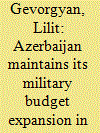

|
|
|
| 2 |
ID:
111248
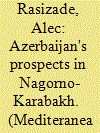

|
|
|
|
|
| Publication |
2011.
|
| Summary/Abstract |
Modern Azerbaijan is a typical Middle Eastern petrostate ruled by a classical Middle Eastern despot, where political (and economic) power is concentrated and inherited within the ruling family. Azerbaijan's military compact with Turkey, signed in 2010, suggests that Baku is preparing for war to take back Nagorno-Karabakh. Due to Azerbaijan's impending economic and strategic insignificance to the West after the peak of oil production in 2010, Azerbaijan needs to become more realistic in its claim to Nagorno-Karabakh, as its ability to persuade the great powers is set to dwindle synchronously with the depletion of oil reserves from 2011 to 2019.
|
|
|
|
|
|
|
|
|
|
|
|
|
|
|
|
| 3 |
ID:
095132
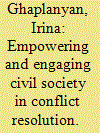

|
|
|
|
|
| Publication |
2010.
|
| Summary/Abstract |
Civil societies in Armenia, Azerbaijan and Nagorno-Karabakh have become alienated from the actual process of conflict resolution and need to be engaged in the political bargaining of the issue. This article addresses the importance of engaging civil society more deeply in this process. Only by empowering citizens through greater awareness and engaging civil society will the political elites from all sides of the conflict be forced to act more responsibly and participate in a more sincere and significant dialogue based on compromise rather than threats. To break the current deadlock, a new citizen-based initiative is needed based on a willingness to humanize the alleged enemy, consider options other than war, realize that the lives of immediate family members are at stake, learn about the benefits of compromise, and engage in reconciliation processes.
|
|
|
|
|
|
|
|
|
|
|
|
|
|
|
|
| 4 |
ID:
112970
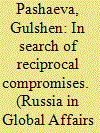

|
|
|
|
|
| Publication |
2012.
|
| Summary/Abstract |
Hostilities between Armenia and Azerbaijan were terminated in 1994, but the sides remain divided over the status of Nagorno-Karabakh. Baku argues, with reliance on European practices, that the sole way towards reconciliation between the two neighboring peoples lies in the self-determination of Nagorno-Karabakh as part of Azerbaijan and the highest degree of self-government granted to it.
|
|
|
|
|
|
|
|
|
|
|
|
|
|
|
|
| 5 |
ID:
163164
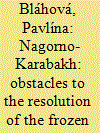

|
|
|
|
|
| Summary/Abstract |
The enduring deadlock in peace negotiations between Armenia and Azerbaijan over Nagorno-Karabakh has created a special, “frozen” phase in the conflict cycle. Several cases of skirmishes, escalating in 2016 during the Four-Day War, demonstrate the security threat the conflict represents. Simultaneously, ongoing unsuccessful peace talks and escalations and de-escalations of violence at the line of contact indicate the failure to transform the conflict in either a peaceful or a violent way. This paper seeks to identify conditions contributing to the stalemate of the conflict. The key actors contributing to the conflict’s “frozenness” are the political leadership of Armenia and Azerbaijan and third parties represented by the Minsk Group. The failure to achieve a peaceful transformation is given by political hostilities carried out through negative labelling, uncompromising statements and the self-victimisation of the belligerents. Such activities deepen the grievances within the Azerbaijani and Armenian populaces, which in response to such behaviour does not support any concessions in negotiations. At the same time, the Minsk Group does not provide any concrete model for a peaceful settlement nor does it apply pressure on the belligerents to grant concessions. A violent transformation of the conflict is not possible due to the presence of third parties in the region which deter the belligerents from full-scale war. These findings indicate that in order to avoid the future failure of negotiations and violent escalations at the line of contact, the political leaderships of Armenia and Azerbaijan need to withdraw from mutual hostilities, the negotiation agenda and framework need to be changed and the third parties involved have to actively participate in the peace process.
|
|
|
|
|
|
|
|
|
|
|
|
|
|
|
|
| 6 |
ID:
095134
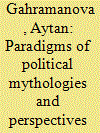

|
|
|
|
|
| Publication |
2010.
|
| Summary/Abstract |
It is widely held that reconciliation follows conflict resolution. However, in the case of "frozen" conflicts, where the negotiation process is protracted and reconciliation is postponed for years, negative transformations take root. In this respect, attention to the past cannot be overestimated. How the past is framed in the domestic public sphere is an indicator of potential positive or negative transformation. By analyzing the frames of political mythology, the elements of ethnic identity and the historicisms based on divergent narratives of the political discourse in rivaling Armenia and Azerbaijan, this article argues that discourse transformation is vital to a successful reconciliation process where the role of mid-level leaders is crucial. While political mythology forces events by creating a context for negative transformation of the conflict, peacebuilding can support a protracted pre-settlement phase ('no peace, no war') and can also facilitate the conflict settlement process through positive transformation. In order to cope with the Nagorno-Karabakh conflict, at least in its relational aspect, the whole discourse infrastructure must be transformed. For this to happen, peacebuilding must be linked to reconciliation goals.
|
|
|
|
|
|
|
|
|
|
|
|
|
|
|
|
| 7 |
ID:
122781
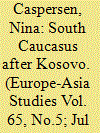

|
|
|
|
|
| Publication |
2013.
|
| Summary/Abstract |
The recognition of Kosovo did not go unnoticed in other aspiring states, but did it necessarily lead to renewed hopes for independence? Drawing on interviews with key actors, this essay analyses its effect in Nagorno-Karabakh. It finds that separatist demands are shaped by a complex interplay of external and internal forces, including international norms and practices. This explains the rather surprising finding that the Karabakh leaders in response to the recognitions of Kosovo, Abkhazia and South Ossetia gave up on recognition, at least temporarily, and instead started championing non-recognition as an attractive, sustainable status.
|
|
|
|
|
|
|
|
|
|
|
|
|
|
|
|
| 8 |
ID:
114099
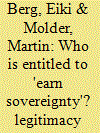

|
|
|
|
|
| Publication |
2012.
|
| Summary/Abstract |
Abkhazia and Nagorno-Karabakh are internationally unrecognised political entities, or so-called de facto states, that have emerged as a result of the incomplete and contested state-formation of their parent states and of the secessionist movements that emerged in the power vacuum of the post-Soviet space. In addition to examining the conventional reliance on the self-determination principle, usually followed by a call for international recognition (as often practised by emerging sovereigns), this article aims to survey whether these political entities have proved that they embody 'rightful authority' as such and whether they 'have earned their sovereignty'. In other words, it attempts to examine the self-determination claims in Abkhazia and Nagorno-Karabakh based on legitimacy criteria that are widely accepted for liberal democratic societies using an analysis of the respective issues as they were represented in focus-group discussions in these two regions.
|
|
|
|
|
|
|
|
|
|
|
|
|
|
|
|
|
|
|
|
|